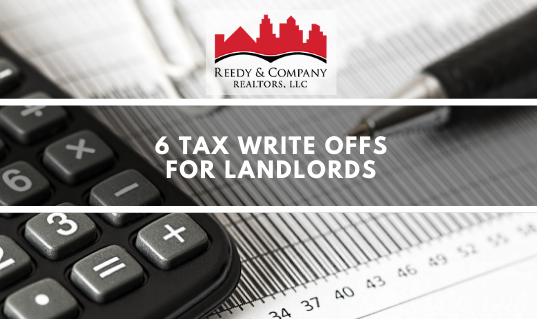If you decide to become a landlord, you need to treat it like a business. You are going to need to keep up with your paperwork and start to prepare for tax season. To do so, you need to know what you can and can’t write off with your new business. Some are cut and dry, while others are a little more complicated. For this reason, you should consult a tax professional as soon as (or before) you start your new adventure.
Tax Deductions For Landlords
Here are some common tax write-offs that you won’t want to miss.
Interest
You can write off your mortgage interest on your property. However, you can also write off interest on other loans and credit cards that you use to buy and improve your properties. You may use your credit cards to help you track the improvements that you make in your property, such as fixing leaking faucets and other maintenance.
You can also write off interest when you use your loans and cards for activities that you have related to your business. This includes any parties and get together that you have to get new tenants or even as a way to thank your current ones.
Depreciation
Depreciation can be hard to understand. The truth is that your rental property is going to decrease in value so you can write that amount off on a yearly basis. However, how much you can write off may be hard to figure out so it is important to talk to a professional to make sure that you handle it properly.
Employees and Independent Contractors
If you hire employees to help you run your business, you can write off their expenses. If you hire independent contractors to mow, clean up snow, and do maintenance around the property, that counts too!
Professionals You Turn To
As a landlord, you are going to work with a lot of other professionals and you can write off these expenses too. This includes your lawyer’s fees, accountant, tax professional, and even those who guide you through the real estate process. If you use a management company to run your business, that is also an expense that you can write off. Investment advisors also count.
Travel
Though most landlords don’t really think that they travel a lot, the truth is that they may be traveling around town looking at properties. They may also travel out of town to look at additional properties. Landlords can even deduct costs for traveling to home improvement stores and other places that they need to go that are related to their rental business.
Marketing expenses
Though you may consider marketing just part of running a business, the truth is that you can write these costs off. This includes any ads that you may place in newspapers and any postage that occurs when you mail things out. If you decide to build a website and maintain it, these costs should be deducted. If you hire someone to do this for you, that is an expense that can be written off.
The best way to make sure that you are prepared for tax season as a landlord is to hire an experienced tax professional. He or she will make sure that you don’t miss any tax write-offs and you can keep as much as your hard-earned money as possible!
Your tax professional will be able to make sure that you don’t forget any interest that occurs, your depreciation, and any marketing expenses. He or she will make sure that you deduct any employees, contractors, and even professionals, including their services)!
If you are thinking about becoming a landlord (or you would like to get some more properties), don’t hesitate to contact us today. We have multiple properties for sale to help you get started.



